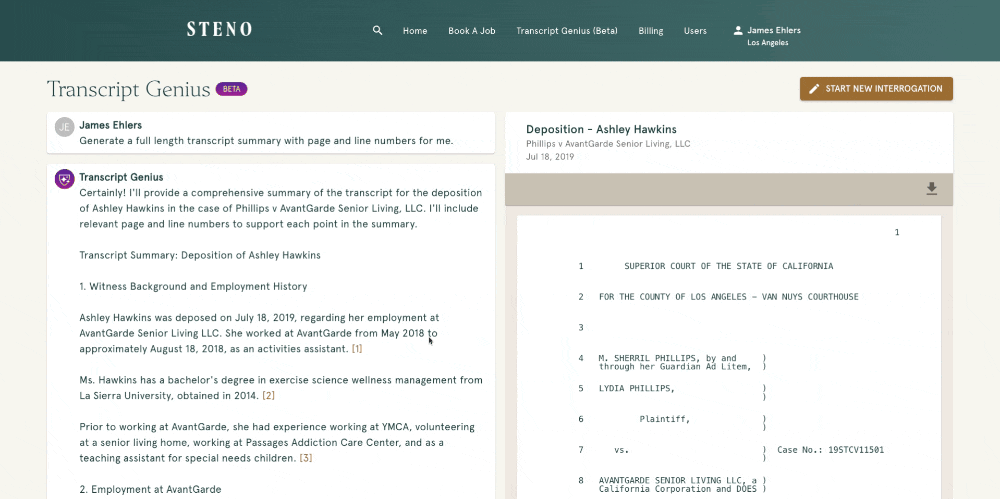
4 minute read
From Hours to Minutes: How Transcript Genius is Saving Attorneys Time with Dynamic Summaries
Attorneys have long struggled with efficiently extracting relevant information from lengthy deposition transcripts. Now there's a way to tackle this issue head-on. Transcript Genius, Steno's AI-powered tool for transcript analysis, is reshaping the way transcript summarization is done.
The Pitfalls of Generic Summaries
Many AI tools on the market claim to summarize depositions, but they often fall short of delivering truly valuable content. The problem lies in their one-size-fits-all approach to summarization. These generic summaries tend to be excessively long, yet can still miss the specific details you're searching for.
For example, when preparing for a summary judgment motion, a typical transcript summary summary may miss nuanced admissions that could be pivotal to your argument. Or when preparing for cross-examination, a generic summary might gloss over subtle inconsistencies in a witness's testimony that could be key to undermining their credibility.
This approach can leave attorneys wading through pages of irrelevant information, still unable to pinpoint the crucial facts they're after.
Transcript Genius: Customization At Your Fingertips
Transcript Genius takes a fundamentally different approach to summarization. Instead of broad, unfocused summaries, it offers attorneys the power to generate customized summaries.
With Transcript Genius, you're in the driver's seat. You can instruct Transcript Genius to focus on specific aspects of the deposition that are most relevant to your case strategy. For instance, you might ask:
"I'm preparing a motion to dismiss based on the statute of limitations. Show me a summary of all evidence that would support such a motion."
This level of specificity ensures that the resulting summary includes all the important details you need, rather than condensing the deposition into vague generalities.
Iterative Refinement
But Transcript Genius doesn't stop at providing tailored summaries. It goes a step further by including the ability to refine and iterate on summaries in real-time. If you need more detail on a specific point or want to explore a new angle, you can simply ask follow-up questions.
For instance, users have found value in asking questions like:
- "Can you provide more detail on the witness's description of the accident scene?"
- "Include quotes the describe what the deponent says about checks."
- "Provide more detail about the testimony related to hazardous materials."
- "Group the summary into key topics with the key topic as the header for each paragraph."
- "Include any objections in the summary."
- "Can you add in the months that the events occurred?"
This iterative process allows you to dive deeper into the testimony, uncovering insights that might have been missed in a traditional summary.
Verifiable Results
Transcript Genius goes a step further by including linked citations to the original transcript for every key point. These clickable links allow you to instantly verify any part of the summary against the original transcript.
This feature is crucial for building trust in the AI-generated content, both for yourself and when sharing with colleagues or supervisors. You can quickly spot-check the summary, ensuring that no critical context is lost and that the AI's interpretation aligns with the actual testimony.

Multi-Transcript Summaries: Connecting the Dots
While custom summaries of individual transcripts are invaluable, Transcript Genius takes its capabilities a step further with multi-transcript summaries. This feature allows attorneys to analyze and synthesize information across multiple depositions, providing a comprehensive view of the case that would take an extraordinary amount of time to achieve manually.
Imagine you're working on a complex product liability case with depositions from multiple engineers, executives, and expert witnesses. Instead of reviewing each transcript individually, you can ask Transcript Genius to create a summary that spans several relevant depositions. For example:
"Summarize all testimony related to the product's safety features, highlighting any contradictions between witnesses and noting key admissions from company executives."
This type of multi-transcript summary provides a bird's-eye view of the case, allowing you to quickly identify patterns, inconsistencies, and key themes across all testimonies.
Time Savings Without Sacrifice
The ability to generate these focused, verifiable summaries – both for individual and multiple transcripts – in minutes rather than hours is a game-changer. It allows you to quickly digest key information while maintaining the ability to dive deeper into the original testimony as needed. This balance of efficiency and accuracy is what truly sets Transcript Genius apart in the world of legal AI tools.
This transformative impact is already being felt by legal professionals. As Brian Panish, Senior Partner at Panish Shea Ravipudi LLP, notes:
"Transcript Genius is a game-changer. It's refreshingly easy to use, and the content it produces is exceptional. It has transformed our trial prep process. Steno has set a new industry standard."
Transcript Genius isn't just about saving time – it's about gaining a strategic advantage. By freeing up hours previously spent on manual review, attorneys can focus on higher-level strategy, client communication, and case preparation.
Ready to move beyond basic summarization and experience the future of transcript analysis? Transcript Genius is available for free with all Steno depositions. Try it now and transform how you interact with deposition transcripts.
Table of Contents
Get the latest from The Brief directly in your inbox
Dylan is the Co-Founder, President and Chief Legal Officer at Steno, where he leads the organization's business development efforts. Dylan is also a founding member of Stalwart Law Group, recognized as one of the top 20 litigation boutiques in California. He is a practicing trial lawyer with more than 15 years of experience in intellectual property, professional liability, and commercial litigation.
AVAILABLE NATIONWIDE
The court reporting you need. The service you deserve.

Recommended for you:


Beyond Innovation: Why Transcript Genius Won LegalTech AI Innovation of the Year
When Steno launched Transcript Genius, we set out to solve a fundamental challenge in litigation:...
Read Blog Post
Embracing AI: Transcript Genius Helped This Customer Reclaim Her Time
Monica Burneikis understands the value of her time—and not because she bills by the hour. A...
Read Blog Post




.png)


